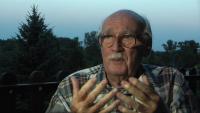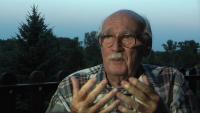Being a doctor under Rákosi‘s and Kádár‘s regime
Gábor Brooser, born in 1927 professor, eye-specialist His father was a doctor, an eye-specialist. He recalls that his father‘s religion was Protestant while his mother‘s religion was Roman Catholic. He studied at Lónyay Reformated Gymnasium. He was a member of the Hungarian Scouting organization. He had to join the army in 1944.. His parents saved a number of Hungarian Jews during the war. In the winter of 1944, one of his friends who was sitting at the table beside him, died due to a Soviet ground strike. He joined the Hungarian resistance against the Arrowcross Movement. He was arrested by the Arrowcross members, but he successfully escaped. In the summer of 1945 he was offered a position as assistant to the communist politician, László Rajk which he refused. Then he was already a member of the Smallholders Party youth movement, the anti-communist democratic party. He was there when the lead-party members awaited for the return of Ferenc Nagy, prime minister of the Smallholder party from Switzerland. The prime minister never returned but was blackmailed and forced to resign by the communists during his official journey to Switzerland. He was at the southern border of Hungary when war almost broke out between Hungary and Yugoslavia. He remembers that a number of doctors were hanged because of a pneumonia epidemic that had spread amongst the soldiers due to poor conditions. On October 23, 1956 he joined the march across the city. At the Parliament building, the police seeing the gathering crowd, turned off the lighting. The people then lit newspapers like torches to make some light in the dark. At the clinic where he worked during the days of the revolution, they provided care to the Hungarian freedom fighters as well as wounded Soviet soldiers and members of the state authority.


